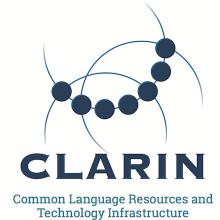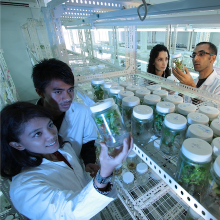Database

CLARIN: Multilingual research data and tools
In light of the COVID-19 pandemic, the Common Language Resources and Technology Infrastructure (CLARIN) provides new research resources. One of the actions currently being prepared is a campaign aimed at extending the curated collections of parliamentary data sets from all over Europe with the records of recent debates on the Corona dynamics. The enhanced data can be the basis for comparative research into the ways in which public bodies have responded to the crisis across countries. Additionally, CLARIN will focus on supporting the development of tools for detecting mis- and disinformation to be applied to news sources and social media platforms. The uniqueness of these resources is that they are available in all European languages, allowing a multilingual approach to COVID-19 related research.

ELIXIR-CZ: Life science data services
The Czech National Infrastructure for Biological Data (ELIXIR-CZ) provides a research infrastructure for the storage, processing and analysing data in the field of life sciences. ELIXIR-CZ has launched a website dedicated to COVID-19, where experts and the general public can find information on activities related to the fight against COVID-19. The website provides recommendations for data storage and sharing and the information on access to relevant data. ELIXIR-CZ specifically provides assistance in setting up the FAIR data principles, special software and analytics tools, and computing resources to help analyse data sets.

CZ-OPENSCREEN: Coronavirus sample testing and database
The National Infrastructure for Chemical Biology (CZ-OPENSCREEN), Czech node to EU-OPENSCREEN ERIC, hosted by the Institute of Molecular Genetics of the Czech Academy of Sciences, plans to test up to 1,000 samples per day. CZ-OPENSCREEN focuses on the identification of new molecular probes and tools for research and validation of compounds suitable for the development of new drugs. The team has also developed the internal database CORONAbase, to register samples and to transform all the appropriate personal data to an electronic version. CZ-OPENSCREEN is sharing the know-how of high-throughput workflow for RNA isolation and preparation of RT-qPCR reactions, as well as the CORONAbase, with other academic institutions involved in Covid-19 testing, in order to improve their testing services and standards.

GENCI: High performance computing and storage facilites
GENCI, the French HPC agency, is providing its HPC (high performance computing) and storage facilites (located into 3 national centers: TGCC for CEA, IDRIS for CNRS and CINES for French Universities), as well as the user support resources to researchers from academia and industry working on COVID-19. Such supercomputers are used to accelerate modelisation/simulation workloads, post-processing of massive amount of data and use at scale of artificial intelligence. Already 15 projects have been benefited from such fast track, in the fields of massive docking, development of vaccines and therapies, epidemiological research on the spread of the virus, and related applications.

EVAg: Development of SARS-Cov-2 diagnostic test
The European Virus Archive (EVA-Global) is a virtual collection for human, animal and plant viruses, that provides researchers with the necessary material for diagnosing Coronavirus infection. EVAg has developed, and published on January 21st, 2020, the now worldwide used PCR based SARS-Cov-2 diagnostic test. To date, more than 1000 kits of reagents and reference materials have been delivered worldwide, using EVAg budget provisions.

EU-OPENSCREEN: Access to pilot compound library
EU-OPENSCREEN and its partner sites are actively involved in the study of SARS-CoV-2, aiming to identify therapeutics and search for diagnostics. EU-OPENSCREEN provides a fast access track for scientist wishing to use their pilot compound library for their COVID-19 related research activities.

METROFOOD-RI: Data on food & COVID-19
METROFOOD-RI, the Infrastructure for promoting Metrology in Food and Nutrition, has created a dedicated page with an organised and continuously updated collection on the official information, research findings, risk assessment and monitoring results related to food & COVID-19, with reference to the whole food chain, from primary production to final consumption.

EMBL-EBI: Biomedical data resources
In response to the current outbreak of COVID-19, EMBL-EBI is gathering and sharing data resources as they become available. Researchers can now see a breakdown of relevant data hosted at EMBL-EBI on the Pathogen Portal. This includes sequences of outbreak isolates and records relating to coronavirus biology. Researchers can also find instructions for submitting data to the European Nucleotide Archive (ENA). EMBL has recognised the urgency to identify and consolidate needs around creating a European COVID-19 Data Platform for data/information exchange, connected to the European Open Science Cloud (EOSC.

ELIXIR: Life science data tools and resources
ELIXIR, the ESFRI Research Infrastructure for life science data, provides a range of services and resources, that can be used by researchers and consortia working on SARS-CoV-2 research via ELIXIR Nodes. ELIXIR has also initiated new community-driven initiatives (e.g. Hackathons) that help to open up and link COVID-19 data. As details become available, they will be published on the ELIXIR COVID-19 webpage linked below.

LINDAT/CLARIAH-CZ: Computing cluster capacities
LINDAT/CLARIAH-CZ and its host institution – the Institute of Formal and Applied Linguistics at the Faculty of Mathematics and Physics, Charles University, Prague – offers its computing cluster capacity for research computation devoted to fight the SARS-CoV-2 coronavirus and Covid-19 disease, in the amount of ~1000 CPUs, for the period of three months, starting 1st April 2020. More information on how to apply for an account and quota on the cluster, plus a technical description of the capabilities of the cluster, how to run jobs, transfer data etc., can be found here. Please note that decisions to allow access will be made at the discretion of the research infrastructure management and mainly on first-come first-serve basis if fulfilling the above criteria.
LINDAT/CLARIAH-CZ is a joint distributed Czech national node of the pan-European CLARIN ERIC (Common Language Resources and Technology Infrastructure) and DARIAH ERIC (Digital Research Infrastructure for the Arts and Humanities) networks.
